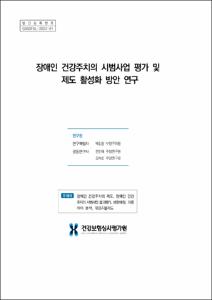장애인 건강주치의 시범사업 평가 및 제도 활성화 방안 연구
- Type
- Research report
- Issued Date
- 2022-10
- Keyword
- 장애인 건강주치의 제도; 장애인 건강주치의 시범사업 효과평가; 성향매칭; 이중차이 분석; 묶음지불제도; Health care system for the primary care for people with disablities; Evaluation of the pilot project for the primary care for people with disablities; Propensity score matching; Difference in difference; Bundle payment
- Abstract
- The government has introduced and operated the pilot project for primary care for people with disablities May 2018 to improve the health level and medical accessibility of the disabled. Five years after the introduction of the system, the number of participants in the disabled and the attending physician was very low at less than 1% of the total, raising the need for a comprehensive evaluation of
the system and measures to revitalize the system. This study measured the effect of diagnosing the operation level of the pilot project and the participating disabled, and prepared a plan to revitalize the system through a questionnaire for the participating disabled and their doctor.
Research Method: This study measured the effectiveness of the pilot project by analyzing the current status of participation in the pilot project, changes in medical use behavior and health outcomes of the disabled after participation. In order to evaluate the effect of the system, we compared the results of the participants with group of non-participants through propensity score matching(PSM) and
Difference in Difference(DID).
Research results: The number of disabled people and doctors participating in the pilot project is 1,182 and 60, less than 0.2% of the total. About Half of the disabled were at the level of '0 to 2 times'. In the case of the doctor, the imbalance was severe as the service provision was concentrated on a small number of people, and more than half of the disabled and their doctors left the service at each stage
of the pilot project.
According to the survey, the satisfaction level was high in that it provided visiting medical treatment to the disabled who had difficulty moving, but the disabled had low access to the system due to lack of system awareness, cost burden, and lack of professional services such as rehabilitation services. In the case of medical providers, it was difficult to participate in the system due to the lack of expected profits due to the lack of participants in the system, difficulty in preparing labor costs for visiting medical treatment, and excessive work by the doctor.
As a result of the evaluation of the effectiveness of the pilot project, outpatient dependence rate of higher medical institutions reduced and Relevance Index(RI) increased after participation in the pilot project, and the effect was higher in the group that actively participated.
Conclusion: The pilot project has effect on medical use behaviors and health, and participants' survey results showed high expectation and satisfaction for the pilot project. In particular, the need for the system is very high at a time when the health care of the disabled is neglected due to COVID-19. In order for the performance of such a system to be visible, it is essential to revitalize the system by expanding the demand for the system for the disabled and creating conditions for the doctor to participate in the system.
- Publisher
- 건강보험심사평가원
- Alternative Title
- A study on the evaluation of the pilot project for the primary care for people with disablities and plan to activate the system
- Table Of Contents
- 요약 ···························································································· ⅰ
제1장 서론 1
1. 연구 배경 ······························································································ 2
2. 연구 목적 ······························································································ 5
3. 연구 내용과 방법 ··················································································· 5
제2장 장애인의 건강관리 필요성과 제도 환경 8
1. 장애인 기본 특성 및 현황 ······································································· 8
2. 장애인 건강불평등 ················································································ 18
3. 장애인 건강주치의 제도 연계 기반 사업 ················································· 40
4. 장애인 건강주치의 제도 관련 선행연구 고찰 ··········································· 49
5. 소결 ···································································································· 56
제3장 시범사업 운영 현황 및 이용 수준 분석 59
1. 분석 개요와 산출 원리 ·········································································· 59
2. 시범사업 등록과 참여 현황 ···································································· 63
3. 시범사업 참여 수준 분석 ······································································· 76
4. 소결 ···································································································· 93
제4장 시범사업 효과 평가 95
1. 효과지표 문헌 고찰 ·············································································· 95
2. 분석 설계 ·························································································· 100
3. 분석 결과 ·························································································· 107
4. 소결 ·································································································· 142
제5장 시범사업 참여 저조 요인 및 활성화 방안 수립 144
1. 시범사업 참여자 대상 질적 연구 ·························································· 144
2. 장애인 건강주치의 제도 활성화 방안 수립 ············································ 182
3. 대안적 지불모형 검토 ········································································· 193
제6장 결론 및 제언 211
◾ 참고 문헌 ····················································································· 213
◾ 부록 ····························································································· 218
◾ ABSTRACT ················································································· 237
- Publisher
- 건강보험심사평가원
- Location
- KOR
- Citation
- 박진관 et al. (202210). 장애인 건강주치의 시범사업 평가 및 제도 활성화 방안 연구.
- 파일 목록
-
-
Download
 장애인 건강주치의 시범사업 평가 및 제도 활성화 방안 연구.pdf
기타 데이터 / 6.22 MB / Adobe PDF
장애인 건강주치의 시범사업 평가 및 제도 활성화 방안 연구.pdf
기타 데이터 / 6.22 MB / Adobe PDF
-
Items in Repository are protected by copyright, with all rights reserved, unless otherwise indicated.